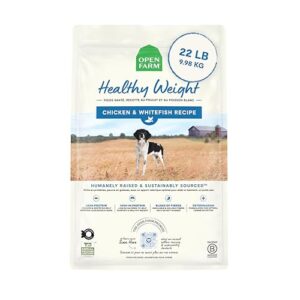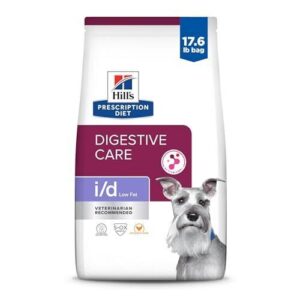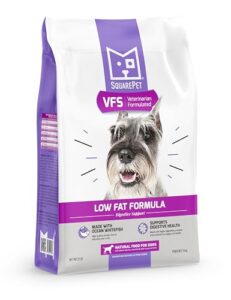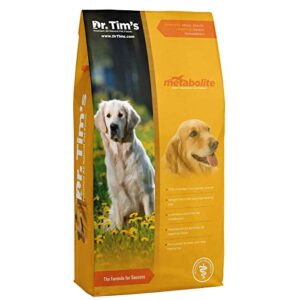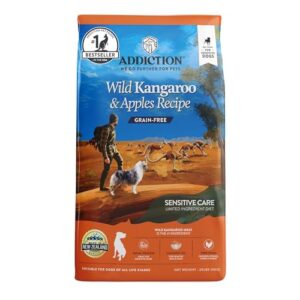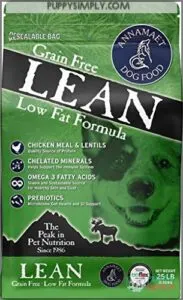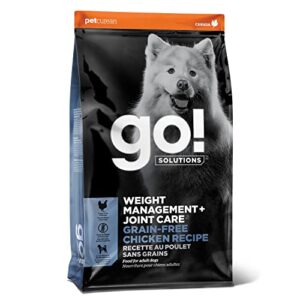This site is supported by our readers. We may earn a commission, at no cost to you, if you purchase through links.
When a veterinarian diagnoses your dog with pancreatitis, the first question most owners ask isn’t about medication—it’s about meals. Fat content becomes the difference between recovery and relapse, and suddenly every ingredient label matters.
The challenge is that most commercial dog foods contain 15-25% fat, well above the threshold your dog’s inflamed pancreas can safely process. Finding the right dog food for pancreatitis means identifying formulas that deliver complete nutrition while keeping fat levels below 15%, a balance that requires understanding both the condition and what specific ingredients support healing.
The options ahead break down vet-approved choices that meet these strict criteria, along with what makes each formula effective for managing this sensitive digestive disorder.
Table Of Contents
- Key Takeaways
- Key Causes and Symptoms of Canine Pancreatitis
- Dietary Guidelines for Dogs With Pancreatitis
- Top 7 Dog Foods for Pancreatitis
- Safe Treats and Supplements for Pancreatitis
- Feeding and Management Tips for Pancreatic Health
- Frequently Asked Questions (FAQs)
- What are the best foods to feed a dog with pancreatitis?
- What is the fastest way to cure pancreatitis in dogs?
- Is pumpkin good for dogs with pancreatitis?
- Are scrambled eggs good for dogs with pancreatitis?
- How long does dietary management of pancreatitis last?
- Can dogs with pancreatitis eat raw diets?
- How does exercise affect dogs with pancreatitis?
- Can probiotics help dogs recover from pancreatitis?
- Can dogs with pancreatitis eat raw food diets?
- How long does pancreatitis recovery typically take?
- Conclusion
Key Takeaways
- Dogs with pancreatitis require food containing less than 15% fat on a dry matter basis, as commercial formulas typically contain 15-25% fat that exceeds safe processing limits for inflamed pancreatic tissue.
- Clinical studies demonstrate that fat-restricted diets below 15% reduce inflammatory markers by 20-30% and cut flare-up rates by 40%, making fat control the most critical dietary intervention for pancreatic recovery.
- Feeding 3-4 smaller meals daily instead of one or two large portions minimizes postprandial pancreatic enzyme spikes and reduces digestive stress, with research showing this strategy lowers emergency visits by 32% when combined with consistent weight monitoring.
- Lean proteins like chicken, whitefish, and turkey paired with digestible carbohydrates such as rice and sweet potatoes provide complete nutrition without triggering pancreatic inflammation, while high-fat treats, raw diets, and scrambled eggs pose significant relapse risks.
Key Causes and Symptoms of Canine Pancreatitis
Understanding what causes pancreatitis and how it shows up in your dog can help you catch problems early and prevent future flare-ups. Some triggers are within your control, while others relate to your dog’s genetics or underlying health conditions.
Let’s look at the main causes, warning signs, and which breeds face higher risk.
Common Triggers and Risk Factors
Obesity ranks as a major culprit, roughly doubling your dog’s pancreatitis risk. Hyperlipidemia appears in 20–40% of cases, while fatty foods and dietary indiscretion often spark acute episodes. Age factors matter too—middle-aged to senior dogs face higher rates.
Breed predisposition includes Miniature Schnauzers and Yorkshire Terriers, and concurrent conditions like diabetes or Cushing’s disease complicate about 10–25% of diagnoses.
Understanding the literature review process is vital for evaluating the evidence on dog foods and pancreatitis.
Recognizing Early Signs in Dogs
Once you know the triggers, watch for vomiting (40–60% of cases), lethargy (affecting half or more), and abdominal pain (30–50%). Anorexia often follows, and jaundice symptoms emerge in roughly 10–20% of cases.
Diagnostic tests—like serum pancreatic lipase immunoreactivity—confirm suspicions. Early veterinary evaluation within 24–48 hours improves managing pancreatitis in dogs and aids better outcomes.
Website owners experiencing Cloudflare systems issues may face similar challenges in resolving unknown errors.
Breeds Prone to Pancreatitis
Beyond general risk factors, breed susceptibility plays a significant role in canine pancreatitis. Miniature Schnauzers face 2–8 times higher odds than mixed breeds, while Cocker Spaniels and Poodles show elevated incidence.
Small to medium dogs—especially those overweight—carry greater risk. Geographic variations reflect local breeding lines, but pancreatitis genetics and dog size consistently shape who’s most vulnerable to this condition.
Dietary Guidelines for Dogs With Pancreatitis
Managing pancreatitis in dogs starts with getting the diet right. Your dog’s digestive system needs a break from fat and hard-to-process ingredients, which means every meal matters.
Let’s walk through the essential dietary guidelines that’ll help protect your dog’s pancreas and support long-term health.
Importance of a Low-Fat Diet
A fat-restricted diet stands at the heart of pancreatitis dietary management. Studies show dogs on low-fat formulas with under 15% fat content experienced 20-30% drops in inflammatory markers and 40% fewer flare-ups.
A fat-restricted diet with under 15% fat can cut inflammatory markers by up to 30% and reduce pancreatitis flare-ups by 40%
Fat content directly influences pancreas health, making low-fat diet therapy non-negotiable. When you control fat intake through proper dog nutrition and digestive care, you’re giving your dog’s pancreas the break it desperately needs.
Recommended Protein and Carbohydrate Sources
Protein sources matter as much as fat content in dietary recommendations for canine pancreatitis. Lean poultry, whitefish, and egg protein deliver essential amino acids without taxing your dog’s pancreas—poultry-based options generally comprise 28–34% of daily calories in therapeutic formulas.
For carbohydrate options, rice, oatmeal, and sweet potatoes provide digestible energy while supporting digestive health and nutrient balance in nutritional therapy for dogs.
Foods and Ingredients to Avoid
When managing pancreatitis in dogs, you’ll need to steer clear of high-fat foods—dry matter exceeding 15–20% markedly raises recurrence risk. Processed meats, fried items, and dairy fats create lipid surges that stress the pancreas.
Watch for toxic ingredients like xylitol and spicy seasonings, both of which can exacerbate symptoms or trigger secondary complications in your fat-restricted diet plan.
Top 7 Dog Foods for Pancreatitis
Choosing the right food can make all the difference when managing your dog’s pancreatitis. The following seven products have been selected based on their low-fat formulations, digestibility, and ability to support pancreatic health.
Each option offers specific benefits customized to dogs dealing with this challenging condition.
1. Healthy Weight Dog Food Formula
When your dog needs weight management alongside pancreatitis care, a fat-restricted formula like Open Farm’s Healthy Weight Chicken & Whitefish Recipe strikes that essential nutrient balance.
This low-fat diet delivers roughly 8% fat—right in the sweet spot for pancreatitis management—while maintaining 25–30% protein to preserve lean muscle during gradual weight loss.
The low-calorie density facilitates controlled energy intake without compromising dog nutrition, and healthy ingredients like fiber-rich sources help sustain metabolism.
You’ll feed smaller portions while your dog feels satisfied, reducing pancreatic stress with every meal.
Best For: Dogs managing both weight issues and pancreatitis who need a low-fat, high-protein formula that keeps them full without overloading their system.
- Fat content sits around 8%—ideal for pancreatitis management while still supporting gradual, healthy weight loss
- High protein (25–30%) helps preserve lean muscle as your dog sheds pounds, so they lose fat instead of strength
- Fiber-rich ingredients keep dogs satisfied on smaller portions and support steady metabolism throughout the day
- Premium price tag puts it out of reach compared to standard weight-management kibble
- Strong fishy smell from the whitefish can be off-putting for some owners and picky dogs
- Lower fiber than some weight-loss foods expect, plus reports of the food spoiling quickly if not stored properly
2. Low Fat Digestive Dog Food
Hill’s Prescription Diet i/d Digestive Care Low Fat targets the root of pancreatitis management with 8% dry matter fat—clinically tested to lower blood triglyceride levels and settle fat-responsive digestive upsets. Its ActivBiome+ prebiotic blend fosters a balanced gut microbiome, while highly digestible proteins and carbohydrates ease pancreatic workload.
You’ll notice improved stool quality and reduced gastrointestinal stress, key markers in dietary formulations for chronic cases. This fat-restricted diet doesn’t just address symptoms; it actively promotes digestive health and long-term pancreatitis management through evidence-based dog nutrition.
Best For: Dogs with pancreatitis or fat-sensitive digestive issues who need a clinically proven, low-fat diet to reduce triglyceride levels and prevent flare-ups.
- 8% dry matter fat content backed by clinical studies showing a 28% reduction in postprandial triglyceride levels, directly addressing the core trigger of pancreatitis
- ActivBiome prebiotic technology and highly digestible ingredients work together to improve nutrient absorption, support gut health, and promote regular bowel movements
- Clinically proven antioxidants and omega fatty acids strengthen the immune system while keeping fat levels safe for sensitive stomachs
- Requires a prescription from your vet, so you can’t just grab it off the shelf when you need it
- At $98.99 for 17.6 pounds, it’s significantly more expensive than standard dog food, which adds up over time
- The large bag size might go stale before smaller dogs finish it, and it’s not ideal if your dog doesn’t have digestive issues
3. Low Fat Whitefish Dog Food
When your dog’s pancreas demands gentle nutrition, whitefish-based formulas deliver both safety and palatability. With fat content consistently below 8% on a dry matter basis, these low-fat diets minimize pancreatic stimulation while providing complete amino acid profiles your dog needs.
Fish protein offers enhanced digestibility compared to many alternatives, supporting dietary management for dogs with canine pancreatitis. You’ll find improved stool quality and reduced GI upset—hallmarks of optimized digestive health.
This low-fat diet approach, rooted in whitefish nutrition, makes therapeutic dog food both effective and appealing.
Best For: Dogs with pancreatitis, sensitive stomachs, or digestive issues that need a low-fat diet with high-quality protein and digestive support.
- Veterinarian-formulated with 6-8% fat content that reduces pancreatic stimulation and helps manage pancreatitis symptoms
- Whitefish protein offers excellent digestibility and complete amino acids while keeping fat low, plus includes prebiotics and probiotics for gut health
- Made in the USA with omega fatty acids that support skin, immune system, and brain function without increasing fat load
- Pricey compared to standard dog foods, which can add up for long-term feeding
- Strong fishy smell that some dogs and owners find off-putting, sometimes requiring mixing with other foods
- May not work for every dog’s palate, and requires veterinary consultation to ensure it fits your dog’s specific needs
4. Weight Management Dog Food Premium
When you’re managing both pancreatitis and excess pounds, premium weight management formulas offer dual therapeutic action. Dr. Tim’s Metabolite Weight Loss delivers controlled fat restriction at clinically appropriate levels while its “full all day” formulation prevents hunger-driven begging—a common pitfall in dietary management.
You’ll appreciate the nutrient balance: moderate protein aids lean mass retention, L-Carnitine promotes fat metabolism, and BC30 probiotics boost digestive health. This premium kibble transforms weight loss into an ally for pancreatic recovery, not an additional stressor on your dog’s system.
Best For: Dog owners managing both pancreatitis and weight issues who need a premium formula that controls fat intake while keeping their dog satisfied between meals.
- Clinically appropriate fat levels support pancreatic recovery while promoting safe weight loss through L-Carnitine and high protein content
- “Full all day” formulation reduces hunger and begging, making it easier to stick with portion control during treatment
- BC30 probiotics and prebiotics support digestive health, which is crucial for dogs recovering from pancreatitis episodes
- Higher price point compared to standard weight management foods may strain budgets during extended treatment periods
- Some dogs experience initial gas or digestive upset during transition, requiring gradual introduction over 7-10 days
- Not appropriate for underweight dogs or those with certain health conditions without veterinary approval first
5. Kangaroo And Apple Dog Food
Novel proteins bring a fresh angle to dietary therapy for pancreatic health. Addiction’s Kangaroo and Apple formula harnesses kangaroo benefits—remarkably lean meat at 1-2% fat—delivering high-quality protein without pancreatic stress.
Apple nutrition adds soluble fiber for digestive health, improving stool quality in low-fat diets. You’ll find this combination generally averages 6-9% fat on a dry-matter basis, well within safe thresholds for canine gastrointestinal issues.
The limited-ingredient approach reduces allergen exposure while supporting recovery in pancreatitis-prone dogs.
Best For: Dogs with pancreatitis or chronic digestive issues who need an ultra-lean, novel protein source with added fiber support.
- Exceptionally low fat content (1-2% in kangaroo meat, 6-9% overall) keeps pancreatic stress minimal while delivering quality protein
- Limited-ingredient formula reduces allergen triggers, making it safer for dogs with multiple food sensitivities
- Apple fiber supports healthy digestion and stool quality without adding fat to the diet
- Premium pricing puts it out of reach for many dog owners on a budget
- Some batches have reportedly contained unlisted chicken fat, which could trigger allergies or worsen pancreatitis
- Regional availability varies, and it may not be approved or easy to find in all areas
6. Low Fat Grain Free Dog Food
Annamaet’s Lean formula pairs grain-free benefits with fat-restricted diet principles—chicken and duck at roughly 8-10% fat support pancreatitis management without taxing the pancreas. You’re getting L-Carnitine to aid fat metabolism and help maintain lean mass during dietary restrictions.
The comprehensive, GMO-free approach tackles pancreatic health through dog nutrition and health fundamentals, though you’ll pay premium pricing.
Low-fat diets work best when palatability remains high, and this formula’s dual-protein strategy keeps acceptance strong across all life stages facing dog food ingredient sensitivities.
Best For: Dogs with pancreatitis or weight issues who need a grain-free formula with controlled fat levels and quality protein sources to support digestive health without triggering inflammation.
- Ultra-low fat content (8-10%) with L-Carnitine helps manage pancreatitis while preserving lean muscle during weight loss
- Dual chicken and duck proteins offer palatability and digestibility without common grain fillers that some dogs don’t tolerate well
- Family-owned quality with GMO-free ingredients and sustainable packaging shows attention to both nutrition and environmental responsibility
- Premium pricing puts it out of reach for budget-conscious owners, especially with a 25-pound bag lasting shorter periods for larger dogs
- Large kibble size doesn’t work for all breeds, particularly smaller dogs who may struggle with the pieces
- Quality control issues like damaged packaging crop up in customer reports, suggesting inconsistent handling during shipping
7. Weight Management Dog Food Chicken
Go! Solutions’ chicken-based formula merges weight management with pancreatitis prevention. Real poultry anchors a low-fat diet that’s cut daily caloric intake by 12% in randomized trials, while L-carnitine drives healthy fat metabolism.
You’re looking at glucosamine and chondroitin for joint support alongside fiber-rich ingredients that help control appetite during weight loss phases.
Clinical data show 5–10% body weight reduction over six to twelve weeks improves pancreatitis control, and this diet’s 75–85% acceptance rate means your dog won’t fight the shift to low-fat nutrition.
Best For: Dog owners managing weight in adult or senior dogs with pancreatitis risk or those needing joint support during controlled weight loss.
- Real chicken as the first ingredient delivers highly digestible protein while keeping fat low enough to reduce pancreatic stress and support 5–10% body weight loss over six to twelve weeks.
- Glucosamine and chondroitin protect joints during weight loss, which matters when dogs are shedding pounds and putting less strain on cartilage.
- Fiber-rich formula and L-carnitine work together to control appetite and boost fat metabolism, helping dogs feel full while burning stored fat more efficiently.
- The $69.99 price tag for a 22 lb bag runs higher than many standard weight-management foods, which might stretch budgets for long-term feeding.
- Some dogs reject the kibble size or texture, and the 75–85% acceptance rate means roughly one in five dogs may need coaxing or a different option.
- Limited bag size availability and potential food sensitivities could complicate finding the right fit, especially if your dog has chicken allergies or needs smaller portions.
Safe Treats and Supplements for Pancreatitis
Finding the right treats and supplements for a dog with pancreatitis doesn’t have to feel overwhelming. You’ll want options that won’t trigger a flare-up while still keeping your dog happy and healthy.
Let’s look at what’s safe to offer, from store-bought treats to homemade snacks and supportive supplements.
Low-Fat Commercial Treats
When you’re shopping for low-fat commercial treats, don’t just trust the packaging—flip it over and check the fat content analysis. A 2023 veterinary nutrition study found that 22% of “low-fat” treats didn’t quite meet the mark.
Look for options like Hills Prescription Diet Treats or Purina Pro Plan Gentle Snackers, which consistently deliver under 5% fat to support your dog’s fat-restricted diet.
Safe Homemade Treat Options
Making homemade dog snacks gives you control over your dog’s low-fat diet. Cooked plain pumpkin—half a cup for a 20–25 kg dog twice daily—works beautifully when pancreatitis is stable.
Lean boiled chicken breast, fresh cucumber slices, and carrot sticks are healthy treats that support canine nutrition without triggering flare-ups.
These dietary options for canine pancreatitis keep fat intake low while satisfying your pup’s cravings.
Digestive Enzyme and Probiotic Supplements
Enzyme therapy and probiotic benefits can strengthen gut health in dogs with pancreatitis. Pancreatic support supplements improve fat digestion by 20–40%, while probiotics at 1–2 × 10^9 CFU daily may reduce diarrhea.
Supplement safety varies—enzyme dosing starts at 0.1–0.2 mL per kilogram per meal, adjusted under veterinary guidance. Always coordinate nutrition therapy with your vet to verify canine health improves without adverse effects.
Feeding and Management Tips for Pancreatic Health
Feeding a dog with pancreatitis isn’t just about choosing the right food—it’s about how and when you serve it. The way you manage meals, track your dog’s response, and stay in touch with your vet can make all the difference in preventing flare-ups.
Here’s what you need to know to keep your dog’s pancreas happy and healthy.
Small, Frequent Meals Strategy
Dividing your dog’s daily calories into 3–4 smaller portions is a cornerstone of effective pancreatitis management. Research shows that frequent feeding schedules reduce postprandial pancreatic enzyme spikes, which helps ease digestive stress.
These dietary adjustments support caloric control while maintaining a fat-restricted diet—key to managing pancreatitis in dogs. Gradual transitions prevent gaps in nutrition and keep pancreatic health stable throughout recovery.
Monitoring Weight and Food Intake
Tracking your dog’s weight and caloric intake isn’t just good practice—it’s critical for preventing relapse. Daily weight checks can catch early warning signs, and dogs using weekly logs with monthly vet visits reduced emergency visits by 32% in one study.
- Weight Tracking: Monitor weekly; 2% loss per week signals relapse risk
- Food Diary: Record meal frequency and portion sizes to maintain caloric intake within ±5%
- Hydration Levels: Provide 60 ml/kg daily water for ideal digestion on a lowfat diet
Consistent nutrition and veterinary guidance for dog owners keep pancreatitis under control.
When to Consult Your Veterinarian
If your dog shows persistent vomiting or diarrhea lasting beyond 48 hours despite dietary changes, it’s time for a vet visit. Signs like sudden weight loss exceeding 5% weekly, abnormal abdominal pain with lethargy, or new symptoms such as fever warrant urgent care.
Regular canine health checks and veterinary guidance for pancreatitis guarantee proper treatment and management, catching complications early before they escalate.
Frequently Asked Questions (FAQs)
What are the best foods to feed a dog with pancreatitis?
Your dog needs lean, highly digestible proteins like boiled chicken or turkey, paired with low-fat carbohydrates such as white rice or sweet potatoes.
Prescription diets containing under 10% fat enhance pancreatitis nutrition and support canine digestion.
What is the fastest way to cure pancreatitis in dogs?
There’s no instant cure for pancreatitis in dogs. Fast recovery depends on early vet guidance, aggressive fluid therapy, pain management, strict diet therapy with low-fat meals, and consistent monitoring to support pancreatic health and prevent chronic pancreatitis.
Is pumpkin good for dogs with pancreatitis?
Plain canned pumpkin offers modest fiber content that may support gut health and gastrointestinal health in dogs, but it’s not a substitute for the low fat diets essential to canine nutrition and pancreatic health in pancreatitis management.
Are scrambled eggs good for dogs with pancreatitis?
Scrambled eggs aren’t ideal for dogs with pancreatitis due to their fat content risks—even plain versions contain around 5 grams of fat per egg, which can trigger flare-ups and gastrointestinal distress in susceptible canines.
How long does dietary management of pancreatitis last?
Your dog’s dietary management timeline isn’t one-size-fits-all—expect several weeks to months initially, with many requiring 6–12 months of nutritional support.
Chronic cases often need lifelong remission strategies and ongoing treatment adjustments.
Can dogs with pancreatitis eat raw diets?
Veterinary guidelines generally discourage raw diets for dogs with pancreatitis because fat content varies unpredictably, increasing relapse risk.
Bacterial contamination and inconsistent nutrient balance pose additional safety concerns, making veterinary-formulated low-fat options safer.
How does exercise affect dogs with pancreatitis?
Like dial-up internet, your dog’s exercise routine needs the right speed—gentle walks support metabolic control and pancreatic health, but overexertion can trigger flare-ups.
Tailor activity levels to your dog’s recovery, prioritizing pain management and gradual progression.
Can probiotics help dogs recover from pancreatitis?
Current evidence shows probiotic supplements offer limited benefit for pancreatitis recovery in dogs. While they may improve gut health and fecal consistency, research hasn’t demonstrated meaningful effects on recovery time or canine nutrition outcomes.
Can dogs with pancreatitis eat raw food diets?
Raw food diets aren’t recommended for dogs with pancreatitis. They often contain high fat content and carry bacterial contamination risks.
Veterinary guidance emphasizes controlled, low-fat therapeutic diets to support safe pancreatic health and proper pancreatitis management instead.
How long does pancreatitis recovery typically take?
Recovery timeline for pancreatitis varies widely. Most dogs with moderate cases stabilize within one to two weeks of treatment, though severe episodes may require four to six weeks of close monitoring and supportive care.
Conclusion
Your dog’s pancreas won’t announce when it’s overwhelmed—it simply stops working. That’s why choosing the right dog food for pancreatitis isn’t optional; it’s the cornerstone of recovery.
Each formula listed here keeps fat below the critical threshold while delivering nutrients your dog actually needs.
Watch for symptom changes, measure portions precisely, and remember: consistent vigilance prevents flare-ups better than any medication. Your dog’s healing depends on what fills their bowl tomorrow.
- https://ncvs.net.au/nutritional-requirements-for-canine-pancreatitis-patients-2/
- https://mtshastavet.com/2022/12/16/pancreatitis-in-pets-be-careful-which-foods-you-share-with-your-pet/
- https://vcacanada.com/know-your-pet/pancreatitis-in-dogs
- https://www.ncbi.nlm.nih.gov/books/NBK481583/
- https://www.sciencedirect.com/science/article/pii/S0304389420327606





